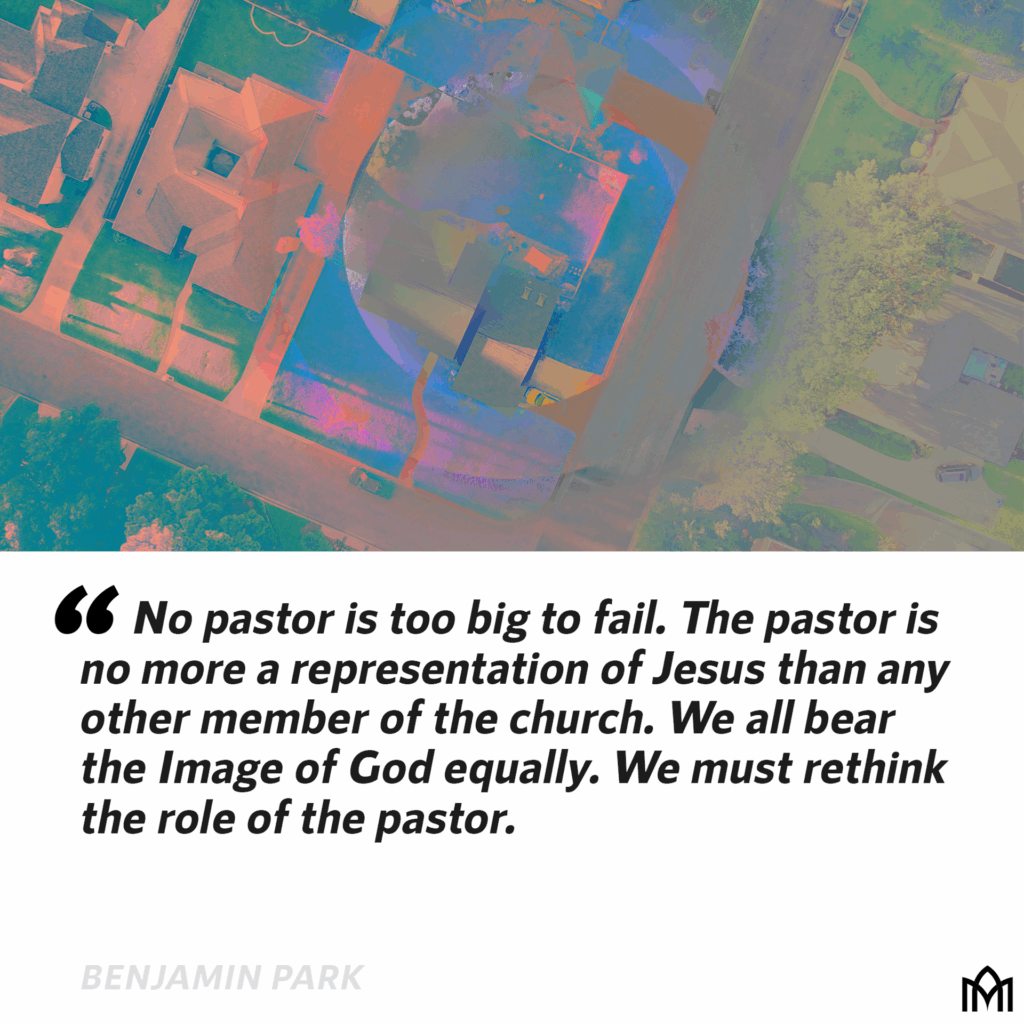We Must Rethink the Role of the Pastor
Dangerous Feedback Loops Need Disruption
Ben, called to be a servant of our friend and Lord, Jesus Christ.
To the Church of God that is in ‘Anytown,’ to those beloved by Christ, anointed by the Holy Spirit, and called to be set-apart ones: Grace to you and peace from the Lord Jesus Christ.
You probably didn’t know this, but every time I think about you I say a quick but heartfelt prayer of gratitude to God, not only because I see Jesus’ grace powerfully working through you for good, but also because this reminds me of Jesus’ deep kindness towards each of us, present before the foundation of the world. It is out of this deep kindness that Jesus called us to follow him together as sisters and brothers.
I generally think of following Christ as a joyful yet strenuous journey, one filled with moments of doubt, confusion, and sometimes despair. What greater sign of Jesus’ love for us is there than the fact that he calls us to go on this journey together, loving and supporting one another, pointing one other to him every step of the way? When you see me lifting my hands in worship to God, this thought is often the reason why.
Do you share my gratitude?
When you’re in the middle of it, sometimes it’s hard to see just how much of an impact Jesus’ grace is having as it works through one’s church. But it is clear from my perspective that your continued effort to gather together as the Church, is in many ways a beacon of Christ’s hope. As you gather, you welcome the Holy Spirit–not only during your formal worship services, but into every relational interaction and kind gesture along the way. You inquire after one another with genuine care, coming alongside those who are in deepest need, whether that be material or spiritual. And in the midst of a generation that feels disconnected to their own souls, you offer a safe harbor to both give and receive soul care.
There is so much more I could say, but my initial point is this:
As you have come together to follow Christ, you have opened the door to Jesus’ grace to work powerfully in so many transformational ways, and I am thankful that you have done this, and that Christ is accomplishing this work in and through you.
And yet, when most of your neighbors think of Anytown Church, they do not experience this grace-filled reality. Instead, as many of you have heard, when your neighbors consider the church, they largely think of endless scandals, greed, abuse, and cover up. How can this be? I have just spoken of the goodness of your community. Have your neighbors lost their wits? Have they somehow been blinded to the true goodness of Anytown Church; perhaps deceived by the Enemy?
The answer to these rhetorical questions is harsh, but true: No, your neighbors have not lost their wits. They simply see what their eyes tell them: that even as many lives within your church have been impacted for good, many others have been simultaneously harmed. Your neighbors know this to be true because it is the lives of their co-workers, friends, and loved ones that are being harmed within your walls.
If this was the whole story, things would be bad enough, but there is still more.
Not only do acts of harm regularly occur within the church of Anytown, instead of addressing them transparently, you attempt to hide them in the name of unity and loyalty. And when your brothers and sisters come forward to bravely speak out against this, your leaders scapegoat them in order to protect themselves!
Perhaps worst of all, you invoke the name of Jesus when you do this. This must not be.
Did not Jesus tell Peter that the Gates of Hades would not prevail against his church (Matthew 16:18)? Why then do we fear and attack those who speak up? What are we trying to protect? If Christ ultimately founded our ministries, then they should flourish in the light. By contrast, if our ministries depend on human power alone, then we shouldn’t be trying to protect them, we should be shutting them down! Either way, when (not if) a sister or brother comes forward to shine a light on harm happening within our churches, we have nothing to fear and everything to gain by listening to them and addressing it openly.
It is not too late to turn things around. Your neighbors have cause for their skepticism, but Anytown Church’s story is still being written. You can act now and change course.
Two thoughts on how Anytown Church can begin to change course before it’s too late:
- Firstly, I strongly urge your community to create a misconduct policy for itself.
I know you might be thinking, “What can words on a page do to fix a situation like this?” On their own, not much. But the very act of coming together as a community in order to write a misconduct policy accomplishes several important things. A community that establishes a misconduct policy acknowledges that harm could potentially occur within its walls, among its members. Now this may seem like the last thing you would want to acknowledge if you are trying to change how people see you. But we are not trying to change our image, we are trying to change our systems and structures. A system that recognizes that harm can occur within it is different from one that does not.
Look at it this way: When your children play sports, does their coach bring a first aid kit? If they do, this doesn’t make them an irresponsible coach who lets their players get hurt. On the contrary, this makes them an adult who knows that, despite their best efforts, injuries happen during games. Such an adult takes responsibility to not only prevent that harm, but to address it when it does occur. This isn’t to say that a coach who doesn’t bring a first aid kit is being malicious in any way. But which coach would you want leading your children–The one who doesn’t have a plan for the possibility that your children might get hurt, or the one who acknowledges the reality of the situation and is prepared to handle it?
A church that takes the time and effort to both acknowledge the need for and then create an actual misconduct policy has opened the door for itself to begin to transform its processes, relationships, and structures, to better take responsibility for the care of its members.This is the love of one’s neighbor as one’s own self, taken to its logical conclusion.
To that end, this helps Anytown Church resist the dangerous drive towards uniformity and loyalty present within every congregation. In any organization, conformity is valued because it’s hard to get anything done if no one is willing to get in line and row in unison. But the shadow side of organizational conformity is the creation of an environment that marginalizes dissenting voices. When dissent is discouraged, an immense pressure builds against those who call out abuse or harm when they see it or are subjected to it. This pressure is made even more intense when these dissented voices call out harm committed by those in leadership.
How do I know this? Because I have lived this reality as a dissenting voice, and have been chewed up by the system.
By creating a misconduct policy, Anytown Church shouts a loud “No!” against the drive towards unity at all cost, and to the normalization of harm, while simultaneously declaring an emphatic “Yes!” to the creation of a new system where the weakest, most vulnerable members of the body have just as much voice as those at the center. A community that makes these proclamations draws a clear line in the sand to all, declaring that no matter how high the pressure to conform may be, there is no space within its walls for abuse or harm to occur.
The shadow side of organizational conformity is the creation of an environment that marginalizes dissenting voices. When dissent is discouraged, an immense pressure builds against those who call out abuse or harm when they see it. Share on X
- Secondly, we must rethink the role of the pastor.
In college, the staff of our campus Christian fellowship encouraged the student leaders to think of Christian leadership as serving as the “sheep dogs of the flock.” We didn’t need to take on the mantle of shepherd, as Jesus capably fills that role already (See John 10:1-21, especially verses 11-17). But we still had a critical role to fill as leaders, which was to help the flock hear and respond to the Voice of our Shepherd.
While of course there are some problems with this analogy, I think the central point is helpful to name explicitly: Far too often churches rely so heavily on one leader that we stop taking our cues from Jesus, the actual Good Shepherd, and start being led increasingly by the pastor’s voice alone. Instead of being a priesthood of all believers (1 Peter 2:9), receiving some help from a few members formally trained in biblical studies, church history, and other theological fields of study, we place the vast bulk of decision making and vision casting in the hands of the pastor. And while this can lead to some healthy church structures, far too frequently, it ultimately creates a system in which the pastor becomes too big to fail.
In this kind of leadership system, a dangerous feedback loop is created. Immense trust is increasingly given to the pastor, and any checks or balances on their power are slowly removed or disregarded. Simultaneously, because the pastor becomes the cornerstone of everything that the church is doing, new checks and balances against congregational power are allowed to form. This consolidation of power is couched in the name of church unity, but the reality of the dangerous feedback loop remains. In the event that the pastor does eventually mis-step in some way, this feedback loop has eroded away any ability for the church to hold that pastor accountable and repair the harm that has been done. In this type of system, the only path forward is for the church to split into two camps: those looking to protect the pastor, and those advocating for those who have been harmed.
A system that recognizes that harm can occur within it is different from one that does not. If Christ ultimately founded our ministries, then they should flourish in the light. Share on X
I am thankful that by all reports, the pastor of Anytown Church has served your congregation faithfully. But we do her leadership a great disservice by placing her and other pastors in this kind of dangerous feedback loop.
No pastor is too big to fail. The pastor is no more a representation of Jesus than any other member of the church. We all bear the Image of God equally. We must rethink the role of the pastor.
Simultaneously, no church is perfect, but the Holy Spirit remains present amongst you, actively reshaping and reforming Christ’s body into ever deeper faithfulness.
What I said at the beginning of this letter still stands: Every time I think of you, I am grateful to our Lord Jesus. The steps of correction I have called you to in this letter are yet another chance to show how powerful the Holy Spirit is moving in your community. I am confident that you will move boldly in adopting them.
The grace of the Lord Jesus be with you. My love be with you all in Christ Jesus. Amen.
~ Pastor Ben
///
*Editorial Note: Letters to the Church is Missio Alliance’s newest long-form series. The latest letter to our growing collection will go live each Friday throughout the rest of 2025. We invite you to prayerfully listen to the Spirit as you read, asking God what you might say to the Church in your own voice. ~CK
“Anyone with ears to hear must listen to the Spirit and understand what God is saying to the churches.” (Revelation 2:29)
Far too often churches rely so heavily on one leader that we stop taking our cues from Jesus, the actual Good Shepherd, and start being led increasingly by the pastor’s voice alone. Share on X





